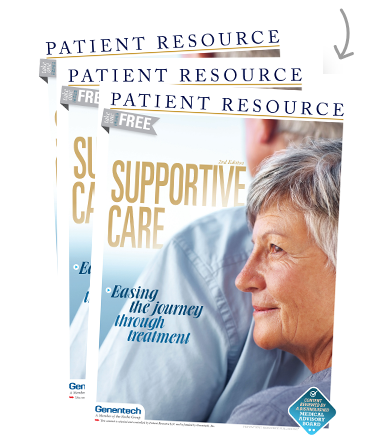Bone Loss
Cancer and its treatments can cause bone loss and damage, resulting in bone pain and fractures. Bone destruction can also be caused by cancer that has spread, which can weaken bone and cause pain. Inactivity, or a lack of physical activity, can also contribute to bone loss. Your health care provider may order a bone density scan, also known as a dual-energy X-ray absorptiometry (DEXA scan), before treatment begins to get a baseline measurement of your bone mass that can be compared with measurements taken later.
What causes bone loss?
Certain drug therapies may cause thinning of the bones. In addition, chemotherapy can reduce calcium levels in the body, which can lead to bone loss. Steroids can interfere with the body’s ability to absorb calcium, which could result in bone loss. Some hormone therapies, such as aromatase inhibitors, can cause it for women depending on their menopausal status. Men being treated with hormone therapies are also at risk.
Radiation therapy results in bone loss only to the part of the body that was treated, but it may not occur for several years. In younger patients, radiation therapy can cause growth-hormone deficiency and delayed bone growth, which can increase the risk of fractures later in life.
When does bone loss typically occur?
Cancer treatment often increases the risk of osteopenia (mild bone degeneration) or osteoporosis (severe bone loss); however, the rate of bone loss depends on your unique characteristics, including age, bone health before diagnosis, family history of osteoporosis, menopausal status and treatment.
Radiation therapy typically does not immediately affect bone health. Deterioration can take several years, making it important to continue to keep follow-up appointments.
How you can manage bone loss
Maintain a consistent follow-up schedule for tests that can detect bone problems, and choose healthy habits such as the following:
- Take medications, vitamins or supplements as prescribed by your health care provider.
- Eat foods that are rich in vitamin D3 to help your body absorb calcium.
- Maintain a healthy body weight. Being underweight increases bone loss risk.
- Walk, jog or perform other weight-bearing exercises to help stimulate cells that help grow bones and build muscle.
- Do not smoke or use tobacco products.
- Limit your alcohol consumption.
- Take safety precautions to prevent falls.
When to call your health care provider
Report pain as soon as it occurs. You may be at increased risk if you experience signs of bone deterioration, including joint or back pain, arthritis-like symptoms, slouched posture or shorter stature. The vitamin D3 level in your blood will be checked periodically to ensure it is at a level of 30 or above. Sometimes, a PET/CT or MRI may be needed to determine whether cancer has spread to the bone. Call your health care professional right away if you break or fracture a bone.



